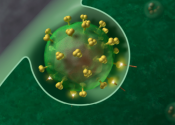Blood T cells are resistant to HIV's primary death pathway
Scientists from the Gladstone Institutes have discovered that blood-derived T cells are resistant to the chief cause of cell death in HIV infection. Instead, it is T cells in the lymphoid tissues that are most susceptible ...
Oct 14, 2015
1
429






